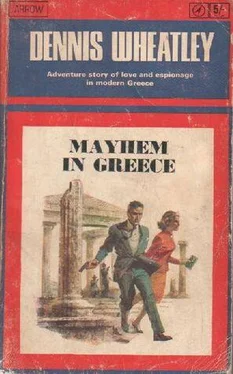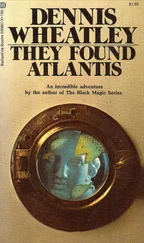Reluctantly, he concluded that, by appealing to Athene, he had laid himself open to becoming a plaything of the Immortals; so he must henceforth take the rough with the smooth, and rely on her to see him through.
As he had brought out from England nearly all his personal possessions he felt that he could hardly be expected to remove all of them that afternoon. He put his immediate requirements into a big suitcase, leaving the rest to be sent after him by arrangement when he had found permanent quarters for himself. Carrying the suitcase downstairs, he went out of the back of the house and crossed the garden.
The Embassy and its precincts occupied the whole block, the large garage at the far end of the garden opening on to Ploutarchou Street, on the opposite side of which was a big block of modern flats. In one of them lived Luke Beecham; so Robbie entered the block and asked for him.
It was a Friday, and to Robbie's dismay the porter told him that Mr. Beecham had just left in his car to spend the week-end with friends who had a seaside villa at Lavrion. This was a sad blow as, although Robbie had made many acquaintances in Athens, there were few that he could call friends, and no one other than Luke to whom he could confide his present trouble.
Still carrying his heavy bag, which, owing to his great strength, caused him little effort, he turned into the main boulevard and walked along it, debating what next to do. To get a room at an hotel was the obvious answer. Had he had the least experience in leading a double life he would have looked for some modest place suited to the role he was playing, but that never occurred to him. Most of the visitors who were invited to lunch or to dine at the Embassy stayed at the Grande Bretagne; so, without further thought, he went to it.
Unlike most more modern hotels, the Grande Bretagne had no shops facing the street occupying a large part of its ground floor level; instead, there were spacious lounges, two restaurants, a ballroom and cocktail bar large enough to have held one hundred people. Yet an air of quiet dignity prevailed and rarely more than a handful of visitors was to be seen sitting about, because so many of its patrons were rich enough to afford private suites.
The money left to Robbie by his parents had been well invested during his minority, so for the past two years he had been in receipt of a very handsome income. Up to the present, even with keeping open the house at Cheltenham, he had found no use for more than a third of it, so he had no hesitation in taking a small suite, as a sitting room of his own would enable him to work undisturbed on his book in the evenings. He would have preferred one that looked out on to the trees and fountains in Constitution Square, which always reminded him of Trafalgar Square in London. Constitution Square was also on a slope and, at its upper end, it was dominated by the Royal Palace, a building somewhat resembling the National Gallery. However, he felt that would be too much of an extravagance, so contented himself with a suite at the back, facing the backs of other buildings.
Having unpacked, he decided to take his mind off his worries by going to a film, and at the Orpheus Cinema saw Alec Guinness and Noel Coward in Our Man in Havana. He had chosen the film solely on the names of its stars, so it struck him as something more than a coincidence that it should turn out to be about the Secret Service. During the show its clever satire caused him to laugh uproariously, but the fact that its bewildered hero came out all right in the end gave him the more sober thought that perhaps Athene had deliberately sent him to see the film in order to cheer him up.
That idea braced him up for the remainder of the evening, but Saturday and Sunday dragged terribly, and during them he suffered from bouts of acute depression. Two visits to the Acropolis failed to bring him even a ray of comfort, and he found it impossible to concentrate sufficiently to work on his book. By Sunday evening, he was doubting his ability even to hold for long his job with the Czechs, let alone succeed in finding out their secret intentions. After dinner, up in his sitting room, he sat miserably, twisting his big fingers together, again sorely tempted to throw in his hand and either return to England or go back to the Embassy and grovel before his uncle. To distract his mind from such unhappy thoughts, he decided to make another attempt to write a few paragraphs of his book. As he took the manuscript from a drawer and laid it on the desk, it fell open of its own accord at Chapter IV. Instinctively he began to read what he had written:
THE HEROES
(no. 1 hercules)
Hercules did so many heroic deeds that I think he is entitled to first place among the Heroes, but he had a sad life and was a very unlucky man. When I say he had bad luck, I really mean that he was constantly pursued by the vindictiveness of that old bitch Hera.
He was a son of Zeus by Alcmene, the wife of Amphitryon, King of Tiryns, which in ancient times was the port of Mycenae. As usual, the Father of the Gods did not let on who he was when he slept with this lady. He simply took the form of her husband and got into bed with her. I suppose he was much better at that sort of thing than King Amphitryon. Anyway, she rumbled him and he was so cock-a-hoop from the good time she had given him that, when he got back to Olympus, he decreed that the next male to be born in Amphitryon's family should be lord over all Greece.
At that, of course, Hera guessed what he had been up to, and flew into a frightful rage. As a first move, she caused poor Alcmene's labour to be prolonged until Hercules's cousin, Eurystheus, was born before him. As Zeus could not go back on his word, Eurystheus became top chap and Hercules his vassal.
Now that the cat was out of the bag, Alcmene did not dare to nurse her own child, so tried to fox Hera by putting her baby out into a field, hoping that his Immortal papa would see to it that someone took care of him. It so happened that Hera and Athene were taking a stroll that way and, seeing the infant, Hera picked it up. At times, apparently, the Immortals were shockingly dense, as Hera had no idea whose the baby was, and put it to her breast. Hercules was already a lusty chap, and he pulled so violently at her that she plucked him off and, in a pet, threw him back on to the ground. Athene, being much more decent, took charge of him and gave him to his own mother to bring up as a foundling.
Hera pretty soon tumbled to the true state of things and, angrier than ever at being had for a mug, sent two snakes to kill Hercules in his cradle. His mother was asleep, and his nurse too petrified by fright to do anything about this; but Hercules woke up, roared with laughter and strangled both the snakes before they could do him any harm.
Woken by the din he made, Alcmene came running in and, amazed at her infant's extraordinary performance, fetched her husband to have a look at the dead snakes. King Amphitryon was so impressed that he sent for Tiresias, a famous blind seer, to tell the babe's fortune. Old Tiresias predicted that Hercules would become no end of a big shot, so Amphitryon had him educated by the very best teachers of all kinds and descriptions.
When he had grown up, the gods put him through a test. They caused him to meet two very attractive girls. One was named Pleasure and the other Duty. Pleasure was a most luscious blonde and offered to sleep with him right away. She also promised him a long life of ease and plenty with lots more blondes thrown in. Duty was a much more modest type and, like Sir Winston Churchill, offered him only blood, toil, tears and sweat. For some reason I can't possibly explain, he chose Duty, and he got exactly what she had promised him.
However, by choosing to follow Duty, he soon became the most famous champion in all Greece. Most of the gods felt that he had done the right thing, so they decided to help him all they could. Athene lent him a suit of armour from her temple. Hermes gave him a magic sword that could cut through anything. Hephaestus made him a special shield, and Apollo gave him some of his arrows. Equipped with these aids, he fairly racketed round Greece, slaying all sorts of monsters. Anyone who had a hydra-headed Griffon ravaging his garden had only to call in Hercules, and he put paid to the beast in no time at all.
Читать дальше












